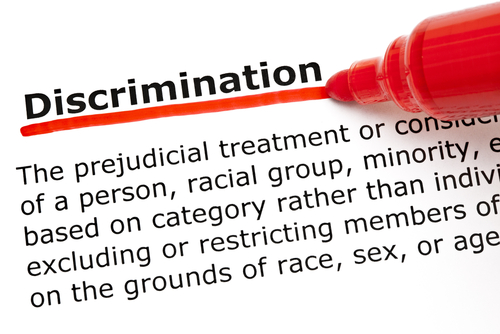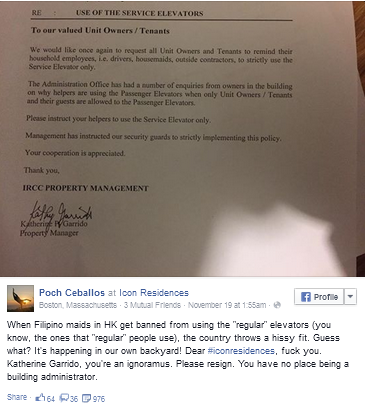The administration of a high-end condominium development in upscale Bonifacio Global City in Taguig recently found itself on the receiving end of derision, as netizens reacted to a building policy they deemed not only “discriminatory,” but also downright “disgusting.”
Icon Residences management recently issued a memorandum requesting its tenants and unit owners to “remind their household employees, i.e., drivers, housemaids, outside contractors, to strictly use the Service Elevator only.”
The memo further states that “only Unit Owners / Tenants and their guests are allowed to use the Passenger Elevators.”
A photo of the memo was posted online by Facebook user Poch Ceballo, with the following caption: “When Filipino maids in Hong Kong get banned from using the ‘regular’ elevators (you know, the ones that ‘regular’ people use), the country throws a hissy fit. Guess what? It’s happening in our own backyard,”
What ensued after the post – which has, as of this writing been shared 977 times – is what normally ensues in this day and age of the Internet. Comments flew back-and-forth, with most netizens extremely irked by the situation.
One user, Cathy Buena said: “Blame the snooty owners who feel entitled to blue-collar-free elevator rides.”
Another, Bianca Lawas commented: “Dapat pagsabihan din yang mga mapagmatang unit owners na yan na ang binili lang nila ay yung unit, hindi yung buong building. LOL. (They should also tell those haughty unit owners that all they purchased are their own units, and not the whole building. LOL.)”
Some felt that the owners were just taking their lead from the policy set into place by the building’s administrators; still others lamented the sad reality that this is, in fact, a ‘common” practice in posh condominium developments.
Following the issue’s blowup on Facebook, online news source, Rappler, got in touch with Katherine Garrido, Icon’s property manager, as well as signatory to the memorandum.
Garrido basically told Rappler that the policy should be a non-issue, as it is merely that: “just a policy” of the building.
“There’s no issue. It’s not for the world. It’s just for the building. It has been a policy ever since the building was created. It’s hard to please everyone, but this is just how the world is,” Garrido said.
This indifference seems to be reflective of the prevalent reality that in most Filipino households, domestic helpers are viewed and treated in a very lowly manner. This, despite the existence of Republic Act 10361 or the Batas Kasambahay (Domestic Workers’ Act), which was implemented in March 2013.
RA 10361 was created to improve the standards of living of domestic workers in Philippine households; most of whom work long, laborious hours for less than the government-mandated minimum wage. The law aims to establish higher minimum wages and validate the employment of household workers by requiring their employers to provide employment contracts, Social Security System (SSS) coverage, as well as enrollment with the Philippine Health Insurance Corporation (PhilHealth), and the Home Development Mutual Fund (Pag-IBIG).

